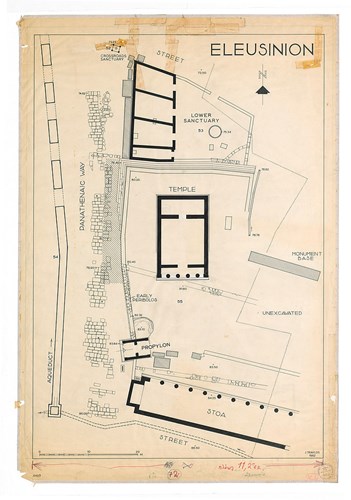Second day | 15th of Boedromion | Agyrmos and prorrhesis
The 15th of Boedromion was essentially the festival's first day and was officially known as Agyrmos. The Archon Basileus, the magistrate in charge of religious rites, invited the Athenians to a festive assembly in the Poikile Stoa. After the necessary sacrifices and prayers for the prosperity of the Greek cities, in the presence of the hierophant and the daduch, came the famous prorrhesis, the official proclamation inviting the people to participate in the Mysteries and be initiated. The exact content of the prorrhesis is not known. Still, it included the reminder that only those who had not committed murder and could understand Greek could participate in the Greater Mysteries.
The prorrhesis did not contain specific instructions for the sacrifices that would follow or the preparations for the ceremonies of the following days, as these procedural matters had probably already been made known to the prospective mystai by the mystagogoi. The hierophant, however, reminded the assembled crowd that revealing the contents of the Mysteries to the uninitiated was a grave offence punishable by law and would no doubt provoke the wrath of the gods. From a purely procedural point of view, it is rather unlikely that there was time or the possibility for strict control of the right of prospective mystai to participate in the Mysteries. Fear of divine retribution should have acted as a deterrent to would-be offenders. There were, of course, exceptional cases where the priests publicly rejected a candidate, as happened with the neo-Pythagorean philosopher Apollonius of Tyana, who was considered a magician and therefore unfit to participate in the Mysteries.
The candidate mystai then went to the City Eleusinion, where they washed their hands in the purification basins next to the entrance. There were specific instructions for the candidates' attire. Heavy and expensive clothes or colourful garments were prohibited. The goddess also forbade jewellery or gold ornaments or embroidery, while women had to have their hair loose on the shoulders and avoid cosmetics. Those who complied with the conditions entered the sanctuary, where they would probably take part in rituals, the content of which remains unknown.

Restored plan of the Eleusinion, Ioannis Travlos, 1962, engraving, American School of Classical Studies / Athenian Agora Excavations © American School of Classical Studies at Athens, Archives, Athenian Agora Excavations





